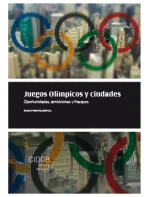Juegos Olímpicos y ciudades: oportunidades, ambiciones y fracasos

Esta publicación conjunta –escrita por investigadores de CIDOB– explora los desafíos y las oportunidades que suponen los juegos olímpicos para las ciudades anfitrionas. Desde su reinicio hace más de cien años, la política ha acompañado los juegos olímpicos modernos, que han sido utilizados para promover intereses nacionales, exhibir visiones ideológicas del mundo y llamar la atención sobre algunas causas –como la lucha contra el racismo y la discriminación de género. Desde la década de los ochenta del siglo pasado, sin embargo, la dimensión económica de las olimpiadas ha pasado a un primer plano, tras el incremento de su comercialización mediante contratos de televisión y patrocinios. Las ciudades que aspiran a acogerlos tratan, así, de presentar una oferta mejor que las demás para aumentar su prestigio y lograr su deseada transformación urbana. Sin embargo, la ciudadanía está cada vez más preocupada por el coste que este evento supone para el erario público y se indigna ante los escándalos de corrupción que se han asociado a su organización. Los Juegos de verano de este año en Río de Janeiro son un ejemplo de ello. Se adjudicaron a la ciudad en 2009, en un momento de optimismo generalizado sobre las perspectivas económicas de los mercados emergentes como Brasil, pero el país sufre en la actualidad una triple crisis nacional (económica, política y social). Por ello, y antes de su inauguración, las Olimpiadas más que entusiasmo generan críticas en Brasil. Lograr unos juegos olímpicos más sostenibles y socialmente aceptados será un reto futuro para las ciudades anfitrionas.
D.L.: B 17501-2016